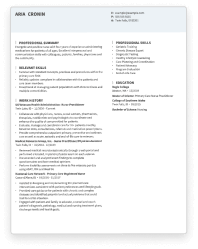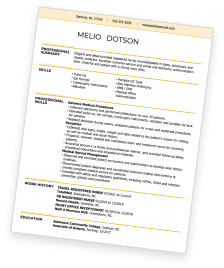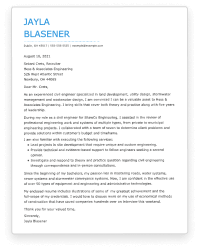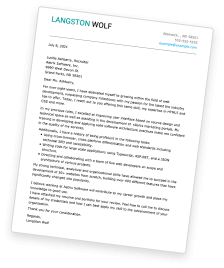Medical Resumes: Overview
Medical professionals play a pivotal role in ensuring the health and well-being of individuals and communities. You’ll find diverse roles in the medical field that require dedication, expertise, and compassion. Some of the key positions in this field include:
- Registered Nurse (RN)
- Medical Doctor (MD)
- Medical Assistant
- Healthcare Administrator
- Medical Laboratory Technician
To excel in the medical profession, it’s crucial to possess essential skills such as clinical expertise, patient care, critical thinking, and a commitment to lifelong learning. Your medical resume should effectively highlight these skills to make a lasting impression on potential employers.
Ready to create a compelling medical resume that opens doors to fulfilling healthcare opportunities? Explore our extensive collection of resume examples and resume templates to start your journey toward a successful medical career.
Medical Resume Example: Healthcare Program Manager
Are you searching for a stellar medical resume example? Look no further. This healthcare program manager resume stands out for several compelling reasons, making it an ideal template for you to use as a template to success.
-
Clean and Organized Layout:
This resume boasts a well-structured layout that ensures easy navigation. Clear headings and organized sections enhance readability to showcase qualifications.
-
Engaging Professional Summary:
This example begins with a concise yet impactful professional summary that immediately conveys the candidate's skills and experience with healthcare roles.
-
Effective Use of Colors:
Subtle color accents draw attention to key sections, adding visual interest without distracting from the content.
-
Quantifiable Experience:
The resume prominently showcases specific relevant medical experience, emphasizing the candidate's expertise through measurable achievements.
Medical Resume Example: Medical Assistant
This resume example of a medical assistant highlights valuable insights for your own resume writing with its balance of excellent aesthetics and content choices.
-
Visually Appealing Design:
Through the use of different shades of blue and rectangular divisions, this resume employs an aesthetically pleasing design that captures attention while maintaining readability.
-
Tailored to the Job:
The resume effectively aligns the candidate's experience and skills with the requirements of medical assistant roles, making it highly relevant.
-
Strategic Use of White Space:
Well-balanced white space ensures that the content is easy on the eyes and thoughtfully organized.
-
Highlighted Achievements:
Notable achievements are prominently displayed, showcasing the candidate's contributions and impact in the medical field.
How to Write a Medical Resume: A Step-by-Step Guide
Crafting an effective medical resume is a crucial step in securing your dream job in the healthcare industry. Follow our comprehensive step-by-step guide to create a standout resume that impresses employers and showcases your qualifications.
-
Contact Information:
Start with your contact details at the top of your resume. Include your full name, phone number, professional email address, and location (city and state). Ensure your contact information is accurate and up-to-date to facilitate easy communication with potential employers.
-
Professional Summary or Objective:
Compose a compelling resume summary or objective statement that provides a snapshot of your qualifications and career aspirations. A resume summary typically highlights your professional experience, skills, and accomplishments, making it suitable for those with relevant work history. In contrast, a resume objective is ideal for entry-level candidates or career changers, focusing on your career goals and how they align with the job you're applying for.
-
Work History:
Detail your work experience in reverse chronological order, beginning with your most recent job. Include the job title, healthcare facility or organization name, dates of employment, and a list of key responsibilities and achievements for each role. Emphasize how you contributed to patient care, medical procedures, and team collaboration. Use action verbs to describe your accomplishments and quantify your achievements wherever possible.
-
Education:
Highlight your educational background, starting with your highest level of education. Include the institution's name, degree earned, major (if applicable), and graduation date. Mention any relevant coursework or academic honors. If you've completed medical certifications or training programs, list them here as well. This section provides context for your qualifications and demonstrates your commitment to professional development.
-
Skills:
Create a dedicated skills section to showcase your medical-related skills. Emphasize attributes like patient care, medical procedures, electronic health records (EHR) systems, medical terminology, and any specialized clinical skills relevant to your healthcare role. Use bullet points for clarity and provide examples of how you've applied these skills in your previous roles. This section allows employers to identify your strengths and abilities quickly.
-
Additional Sections:
Depending on your unique qualifications and experiences, consider adding additional sections to enhance your resume further and make it stand out. Additional sections could include certifications, awards, publications, and volunteer experience.
Key Skills and Certifications For Medical Resumes
In the highly competitive healthcare field, possessing the right skills and certifications is paramount to stand out as a top candidate. Below, we outline the essential hard and soft skills, along with valuable certifications, to elevate your medical resume.
Top 5 Hard Skills for Medical Resumes:
- Patient Care: Proficiency in providing compassionate and high-quality patient care is the cornerstone of a successful medical career. This includes tasks such as administering medications, monitoring vital signs, and assisting with medical procedures.
- Medical Procedures: Competence in performing medical procedures, such as phlebotomy, EKG, wound care, and injections, demonstrates your clinical expertise and contributes to patient well-being.
- Electronic Health Records (EHR) Systems: Familiarity with EHR software, like Epic or Cerner, is essential for efficient patient record management, ensuring accuracy, and facilitating seamless communication among healthcare professionals.
- Medical Terminology: A strong grasp of medical terminology is crucial for effective communication with colleagues and patients. It helps avoid misunderstandings and ensures accurate documentation.
- Diagnostic Equipment: Proficiency in operating diagnostic equipment, such as X-ray machines, ultrasound devices, or MRI scanners, is valuable for diagnostic accuracy and patient care.
Top 5 Soft Skills for Medical Resumes:
- Communication: Effective verbal and written communication is paramount in healthcare to convey information clearly to patients, their families, and fellow healthcare providers.
- Empathy: Demonstrating empathy and active listening skills is vital to establishing rapport with patients, providing emotional support, and addressing their concerns.
- Teamwork: Collaborative teamwork is essential in healthcare settings where multidisciplinary cooperation ensures the best possible patient outcomes.
- Critical Thinking: Healthcare professionals must think critically and make quick decisions, especially in emergency situations or when diagnosing complex medical conditions.
- Adaptability: The medical field is dynamic and constantly evolving. Adaptability to new technologies, treatment methods, and healthcare protocols is crucial for staying relevant and providing the best care.
Top 5 Certifications for Medical Resumes:
- Certified Nursing Assistant (CNA): CNA certification validates your competence in providing basic patient care, such as bathing, dressing, and assisting with mobility.
- Basic Life Support (BLS): BLS certification is essential for healthcare professionals and validates your ability to perform CPR and provide life-saving interventions in emergencies.
- Advanced Cardiac Life Support (ACLS): ACLS certification is crucial for healthcare workers in critical care settings, demonstrating proficiency in managing cardiac emergencies.
- Registered Nurse (RN): RN certification is a standard for nurses, showcasing your comprehensive nursing knowledge and clinical skills.
- Medical Assistant Certification: This certification is valuable for medical assistants, proving your competence in both administrative and clinical tasks in medical practices.
By incorporating these key hard and soft skills, along with relevant certifications, into your medical resume, you’ll position yourself as a sought-after candidate in the competitive healthcare industry. Demonstrating your expertise in these areas is essential for making a positive impression on potential employers.
Helping Job Seekers Like You
12 Tips For Writing A Medical Resume
Effective medical resumes require careful attention to detail and a strategic approach. Follow these essential tips to ensure your resume stands out in the competitive healthcare job market:
- Tailor Your Resume: Customize your resume for each job application by emphasizing relevant skills and experiences that match the specific job requirements. Use keywords from the job description to catch the recruiter’s eye and show that you’re a perfect fit.
- Highlight Clinical Experience: In the healthcare field, clinical experience is invaluable. Showcase your hands-on experience, including internships, rotations, and any specialized skills you’ve acquired during your medical training.
- Emphasize Certifications: Clearly list your certifications and licenses in a dedicated section near the top of your resume. Include certification names, issuing organizations, and expiration dates if applicable.
- Quantify Achievements: Use numbers and metrics to quantify your accomplishments. For example, mention how many patients you’ve treated, surgeries you’ve assisted with, or the percentage of improvement in patient outcomes due to your interventions. Quantifiable achievements make your impact tangible.
- Highlight Patient-Centric Skills: In healthcare, patient care is paramount. Emphasize active listening, empathy, and problem-solving skills, demonstrating your commitment to patient satisfaction and well-being.
- Mention Technological Proficiency: Healthcare is becoming increasingly reliant on technology. Highlight your proficiency with electronic health records (EHR) systems, medical imaging software, or any other relevant technology.
- Address Employment Gaps: If you have employment gaps, briefly explain the reason, whether it’s further education, family responsibilities, or personal development. Use this as an opportunity to mention any relevant activities or volunteer work you engaged in during that period.
- Include a Professional Summary: Craft a concise, compelling professional summary or objective statement at the beginning of your resume. It should grab the employer’s attention and convey your career goals and value.
- Show Licensure and Certifications: Make sure to clearly indicate your licensure and certifications relevant to your medical field. This ensures potential employers can quickly verify your qualifications.
- Proofread Thoroughly: Avoid errors by proofreading your resume carefully. Typos and grammatical mistakes can detract from your professionalism. Consider asking a friend or colleague to review it as well.
- Use a Professional Format: Maintain a clean, organized layout with clear headings and bullet points to enhance readability. Choose a professional font, and ensure consistent formatting throughout your resume.
- Include a Strong Closing: Conclude your resume with a powerful closing statement, expressing your enthusiasm for the position and your readiness to contribute to the healthcare organization’s success.
By following these tips, you can create a medical resume that effectively communicates your skills, experience, and dedication to potential employers, increasing your chances of landing your desired role in the healthcare industry.


Save Time With Our Resume Builder
Key Takeaways:
Customize your medical resume for each job application by emphasizing relevant skills, clinical experiences, and certifications.
Use numbers and metrics to showcase your accomplishments and impact on patient care.
Emphasize patient-focused qualities like empathy, active listening, and problem-solving.
Clearly list your relevant certifications and licenses to demonstrate your qualifications.
Avoid errors, typos, and grammatical mistakes by thoroughly proofreading your resume. Maintain a professional format with clear headings and bullet points.
More Resume Examples
Save Time With Our Cover Letter Builder








